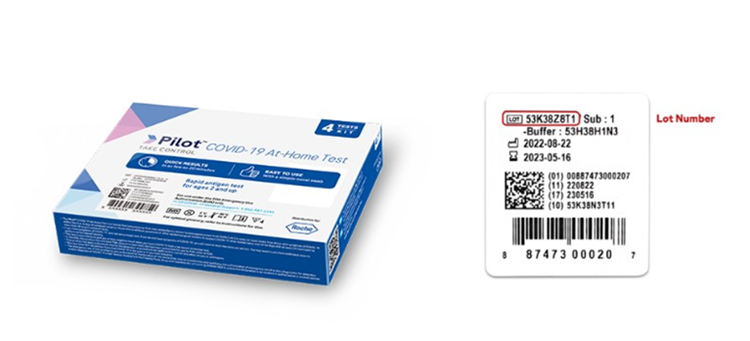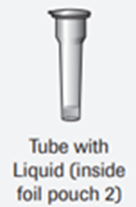Do Not Use Certain SD Biosensor Pilot COVID-19 At-Home Tests: FDA Safety Communication
UPDATE: On May 25, 2023, the FDA classified this recall as a Class I recall, the most serious type of recall.
Date Issued: May 4, 2023
The U.S. Food and Drug Administration (FDA) is warning consumers and health care providers to stop using and throw out certain lots of recalled SD Biosensor, Inc. Pilot COVID-19 At-Home Tests, distributed by Roche Diagnostics. The FDA has significant concerns of bacterial contamination in the Pilot COVID-19 At-Home Test liquid solution, provided in the test kit. Direct contact with the contaminated liquid solution may pose safety concerns and the bacterial contamination could impact the performance of the test.
SD Biosensor, Inc. has initiated a recall for all impacted SD Biosensor Pilot COVID-19 At-Home Tests that were distributed by Roche Diagnostics to certain retailers in the United States. Approximately 500,000 tests were distributed to CVS Health, as well as about 16,000 tests to Amazon. The FDA is working with Roche Diagnostics to understand how many of those tests were sold to consumers.
Importantly, none of the impacted lots were distributed through COVID.gov/tests - Free at-home COVID-19 tests or as part of other federal testing programs. If you received your tests through the COVID.gov/tests distribution or as part of other federal testing programs, they are not subject to this safety communication or product recall.
The FDA is advising consumers to stop using and throw out Pilot COVID-19 At-Home Test kits with the following lot numbers:
| 53K38N1T1 | 53K4221T1 | 53K4292T1 |
| 53K38N2T1 | 53K4222T1 | 53K42A1T1 |
| 53K38N3T1 | 53K4223T1 | 53K42A2T1 |
| 53K38N4T1 | 53K4224T1 | 53K42A3T1 |
| 53K38N5T1 | 53K4225T1 | 53K42E1T1 |
| 53K38P1T1 | 53K4231T1 | 53K42G1T1 |
| 53K38P2T1 | 53K4232T1 | 53K42G2T1 |
| 53K38P3T1 | 53K4233T1 | 53K42H1T1 |
| 53K41T5T1 | 53K4261T1 | 53K42H2T1 |
| 53K41X1T1 | 53K4262T1 | 53K42L1T1 |
| 53K41X2T | 53K4271T1 | 53K42L2T1 |
| 53K41X3T1 | 53K4272T1 | 53K4361AC |
| 53K4211T1 | 53K4273T1 | 53K4362AC |
| 53K4212T1 | 53K4274T1 | 53K4392AC |
| 53K4213T1 | 53K4291T1 |
Recommendations for Consumers, Test Users, and Caregivers
- Check to see if your SD Biosensor Pilot COVID-19 At-Home Test is included in the SD Biosensors product recall by comparing the lot number.
- Do not use test kits with the affected lot numbers listed above. Throw out the entire test kit in the household trash. Do not pour the liquid solution down the drain. Additional information can be found in the Quick Reference Instructions for patients.
- If the liquid in the tube contacts your skin and eyes, flush with large amounts of water. If irritation persists, seek medical attention.
- Watch for signs of bacterial infection caused by exposure to the contaminated liquid solution. If you see signs of infection, such as fever, discharge, red eyes, or any other concerning symptoms, seek medical attention.
- Talk to your health care provider if you think you were tested with an affected Pilot COVID-19 At-Home Test, or if you have concerns about your test results.
Recommendations for Health Care Providers and Testing Program Organizers
- If an antigen test was performed less than two weeks ago using the Pilot COVID-19 At-Home Test, consider retesting your patients using an FDA authorized or cleared SARS-CoV-2 diagnostic test if you suspect an inaccurate result. If testing was performed more than two weeks ago and there is no reason to suspect current SARS-CoV-2 infection, it is not necessary to retest.
- If a patient presents with signs of bacterial infection, such as fever, conjunctivitis, or other signs or symptoms of systemic infection, consider whether they have recently used a Pilot COVID-19 At-Home Test. If they have, consider whether their infection may be from exposure to the contaminated buffer solution.
- Report any problems you experience with the Pilot COVID-19 At-Home Test to the FDA, including suspected false results. See Reporting Problems with Your Test.
Potential Risks
The liquid solution provided in the affected Pilot COVID-19 At-Home Test kits has been found to be contaminated with organisms such as Enterococcus, Enterobacter, Klebsiella and Serratia species. Individuals performing the self-test may run the risk of direct contact with the contaminated liquid in the tube. The liquid is contained in an individual, ready-to-use, pre-filled and sealed tube, but a user may inadvertently come in direct contact with contaminated liquid buffer during opening the tube or handling of the open tube or while performing the test.
Infection from bacteria such as Enterococcus, Enterobacter, Klebsiella and Serratia species may cause illness in people with weakened immune systems or those with direct exposure to the contaminated liquid solution through standard handling, accidental spills, or misuse of the product.
In addition to the risk of infection, this contamination may impact the performance of the test, and false results may occur.
- A false-negative antigen test result means that the test says the person does not have COVID-19 but they actually do have COVID-19. A false-negative result may lead to delayed diagnosis or inappropriate treatment of SARS-CoV-2, which may cause people harm including serious illness and death. False-negative results can also lead to further spread of the SARS-CoV-2 virus, including when people are housed together in health care, long-term care, and other facilities due to these false test results. When false negative test results are received, actions to limit exposure to an infected person might not be taken, such as isolating people, limiting contact with family and friends, or limiting access to places of employment.
- A false-positive antigen test result means that the test says the person has COVID-19 but they actually do not have COVID-19. A false-positive result may lead to a delay in both the correct diagnosis and appropriate treatment for the actual cause of a person's illness, which could be another life-threatening disease that is not COVID-19. False-positive results could also lead to further spread of the SARS-CoV-2 virus when presumed positive people are housed together.
The FDA has not received reports of injuries, adverse health consequences, or death associated with use of the SD Biosensor Pilot COVID-19 At-Home Test to date.
Test Description
The SD Biosensor Pilot COVID-19 At-Home Test is a lateral flow immunoassay device intended for the qualitative detection of the nucleocapsid protein antigen found in the SARS-CoV-2 virus. This test is authorized for non-prescription home use, self-collected anterior nasal (nares) swab samples from individuals aged 14 years or older, or adult collected anterior nasal (nares) swab samples from individuals aged 2 years or older.
FDA Actions
The FDA has classified the recall for these tests as a Class I recall, the most serious type of recall.
The FDA is continuing to work with SD Biosensor Inc. to assess the company’s corrective actions to address the reason for bacterial contamination and help ensure the situation is resolved and will not return.
The FDA will continue to keep the public informed of significant new information.
Reporting Problems with Your Device
If you think you had a problem with the SD Biosensor Pilot COVID-19 At-Home Test, the FDA encourages you to report the problem through the MedWatch Voluntary Reporting Form.
Generally, as specified in a test's Emergency Use Authorization, device manufacturers must comply with the applicable Medical Device Reporting (MDR) regulations.
Questions?
If you have questions, email the Division of Industry and Consumer Education (DICE) at DICE@FDA.HHS.GOV or call 800-638-2041 or 301-796-7100.


